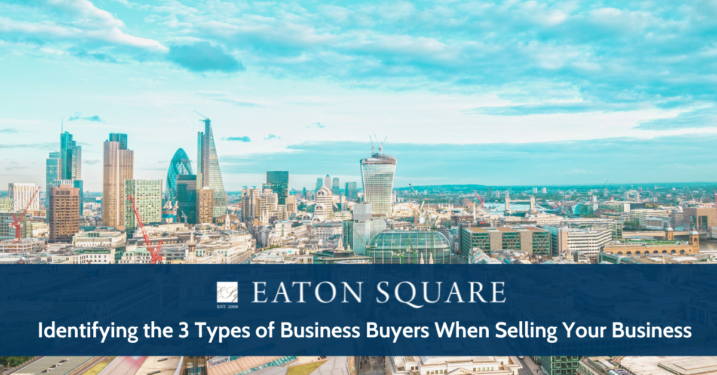
Recognizing the shared traits among different buyer categories can empower sellers to create balance in any scale of business sale.
In middle-market business sales, the value of the deal and the path to a successful closing are significantly influenced by a factor that many sellers tend to underestimate: the specific type of buyer evaluating their company.
The majority of buyers can be categorized into three primary groups:
- Individual Buyers: Comprising seasoned entrepreneurs, former corporate executives or employees desiring independence, and high net worth individuals aiming to build wealth.
- Strategic Buyers: Typically established companies seeking acquisitions to achieve strategic goals such as market expansion, geographic growth, or reducing competition.
- Financial or “Professional” Buyers: Encompassing high net worth individuals, family offices, search funds, institutional investors, venture capital firms, and private equity groups, all driven by strong financial returns.
In the journey of preparing your business for sale and engaging in this crucial transaction, understanding each type of buyer aids in anticipating their priorities and effectively navigating the sales process.
Here’s an overview of each buyer category and its distinct characteristics:
Individual Buyers Defined
Traits: Individual buyers are primarily motivated by personal gains. This group includes serial entrepreneurs, retired corporate professionals, first-time business owners seeking autonomy, and those transitioning from a previous sale and seeking new challenges.
These buyers usually target smaller, well-managed, low-risk businesses that allow hands-on ownership. This makes them attractive to sellers seeking not only a sale but also a buyer who will maintain the company’s reputation, drive growth, care for employees, and pursue expansion. Risk aversion often drives individual buyers, especially those new to business ownership, short on capital, or later in life and less inclined to take risks.
Professional Help: When dealing with various levels of sophistication and integrity in potential buyers, partnering with an IBG Business M&A professional can distinguish credible prospects from less reliable ones. From initial preparation and marketing to confidentiality preservation, buyer evaluation, and negotiation, experienced M&A professionals streamline the process.
Strategic Buyers – Who are they?
Traits: Unlike individual buyers, strategic buyers are established companies that view acquiring your business as a strategic means to their ends. This can involve acquiring competitors to gain market share, entering new geographic markets, or enhancing supply chain efficiency.
The appeal to strategic buyers often extends beyond financial metrics, focusing on product lines, location, intellectual property, customer base, employee expertise, and synergies between the companies. While advantageous, this type of sale can also lead to post-acquisition changes that differ significantly from the original business.
Leveling the Field: Creating competition among potential buyers, guided by an experienced M&A advisor, can help counterbalance the strategic buyer’s transaction experience advantage.
Who Financial Buyers Are
Traits: Financial buyers encompass a wide range, including high net worth individuals, family offices, search funds, institutional investors, venture capital firms, and private equity groups. Their primary motivation is generating substantial financial returns.
They often focus on small and mid-sized businesses, possess financial strength, and either purchase businesses outright or make partial investments. Financial buyers are attracted to businesses with strong, experienced management teams and consistent growth.
Preparation: For sellers anticipating financial buyers, enhancing EBITDA and maintaining a capable management team are key strategies. Financial buyers scrutinize financial statements extensively, aiming to evaluate profitability and returns.
The Value of Working With an M&A Adviser
Regardless of buyer type, enlisting the services of an experienced M&A broker or advisor yields several advantages:
- Expert Guidance: Receive comprehensive education about the sales process.
- Timing Insight: Gain insights into the right time to sell.
- Optimal Preparation: Prepare your business for sale to maximize value.Accurate Financials: Ensure accurate financial statements for potential buyers.
- Confidentiality: Safeguard sensitive information and maintain confidentiality.
- Targeted Marketing: Present your business favorably to qualified buyers.
- Effective Management: Maintain focus on business operations while navigating the sale.
- Multiple Offers: Attract multiple offers, providing price and term options.
- Buyer Assessment: Evaluate buyers’ integrity, background, and financial strength.
- Skilled Negotiation: Benefit from professional negotiation expertise.
- Smooth Transition: Facilitate a seamless transition through closing and beyond.
The sale of your business warrants a high level of professionalism, creating an even playing field regardless of the type of buyer involved.
Preparing your business for sale is an important part of your business. If you would like to discuss the value of your business, please book a complimentary call with any of our senior M&A Advisors.
*This article originally appeared on IBG Foxfin site.
